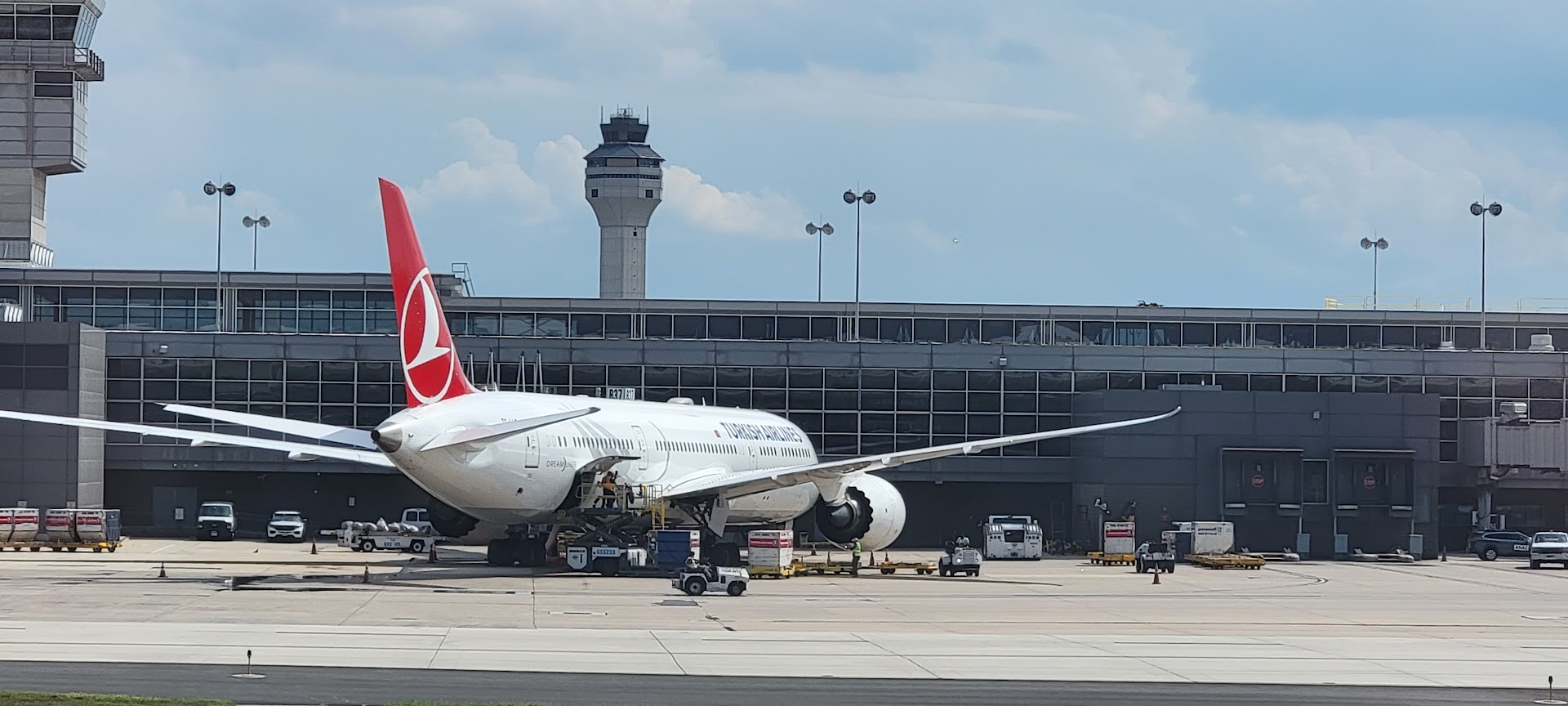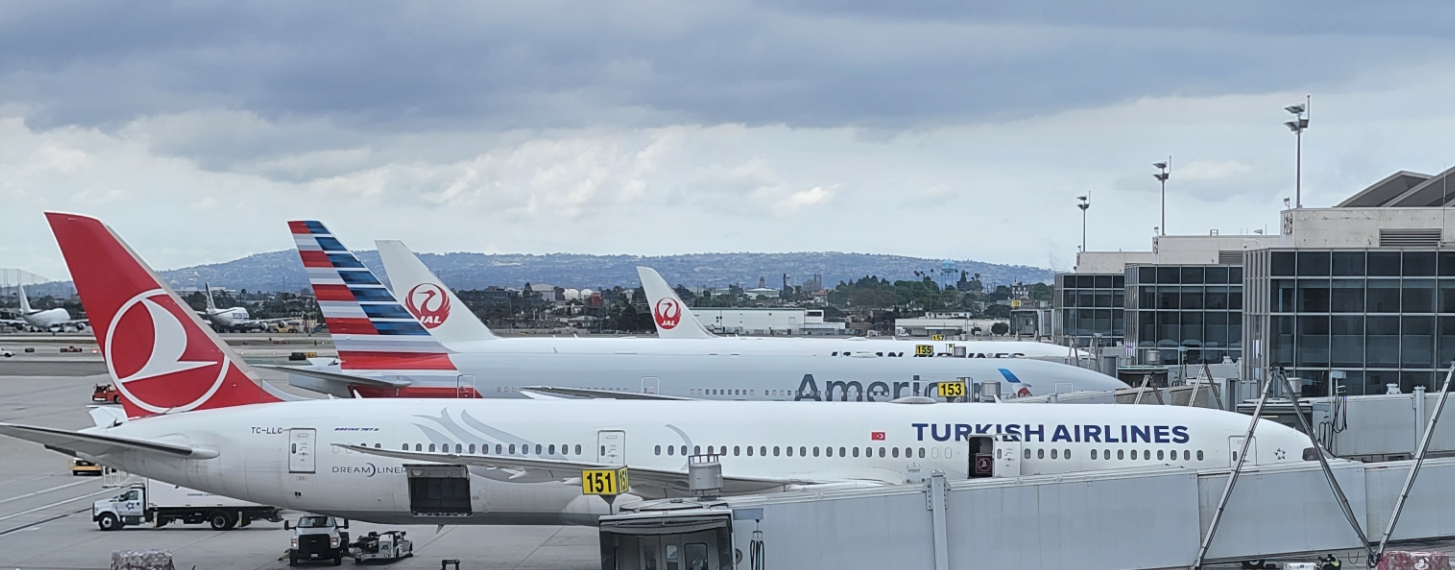Turkish Airlines flies to more countries than any other carrier in the world. They already fly to 14 U.S. cities with the recent launch of Denver and Dallas. The airline isn’t coy about expansion plans. Their Chairman gave an interview where he telegraphed their next four U.S. cities: Philadelphia, Charlotte, Orlando, and Minneapolis.
These add to Atlanta, Boston, Chicago, Dallas, Houston, Los Angeles, Miami, Newark, New York JFK, San Francisco, Seattle, and Washington Dulles.

And the carrier plans a total of 20 cities, which means two more, which seem likely to be Phoenix and Las Vegas but could also be Raleigh or Tampa.
No U.S. airline currently flies to Istanbul.
- United Airlines served Newark – Istanbul but dropped the route in 2013.
- Delta flew to Istanbul but ceased service in 2016.
Assuming Turkish eventually flies to Phoenix they will reach all American Airlines international hubs. American focuses its international service on seasonal routes and joint venture partner hubs. They eschew long haul without partner connectivity at the destination. And they lack the aircraft to experiment with routes or engage in strategic flying.
- American retired their Airbus A330, Boeing 767 and 757s during the pandemic
- New Boeing 787 deliveries are delayed (along with Airbus A321XLRs, which wouldn’t reach Istanbul but could free up widebody capacity from nearer-Europe routes)
- They’ve pushed off some 787-9 deliveries
When Wow Air and Icelandair launched Dallas – Reykjavik service, American Airlines responded in kind. Then-CEO Doug Parker explained their approach to competition at the time,
Somebody starts flying a flight from Dallas to anywhere and American either is already there or we’re gonna be there. Because we’re not going to let customers have another option other than American in and out of here.
American considered making the route year-round. However Wow Air collapsed, and Icelandair pulled out of the market. So despite having less competition on the route, American pulled out of the market as well and moved the flight to Philadelphia for summer 2019.
It was classic anti-competitive behavior, but not something American is in a position to do anymore even if they wanted to. So Turkish Airlines will likely be in every American Airlines hub. They’re a United Airlines partner. And they’re unlikely to fly to Salt Lake City, leaving one Delta hub uncovered.

Meanwhile, Turkish Airlines keeps growing. They have orders for 75 Airbus A350s in place, but options on more and are considering an order for the 777X. They plan to nearly double in size of the next 10 years, growing across Africa and Asia and operating a broad connecting hub along the lines of Emirates. Ironically, U.S. airlines went to the federal government trying to get protection against Emirates, Etihad and Qatar.

Yet Turkish Airlines is more than 49% owned by the government and acts as a proxy for the Turkish government. And they’re the ones growing rapidly in the U.S. market.


I love turkey and admire Erdoğan.
Turkish really gonna bring a flight to CLT before QR
@ Gary — Inky problem is, Turkish has never impressed me as a great airline. Maybe it’s me, and I just need to try yet again.
Only problem….
Good! Turkish business class is incredible. It’ll only get better once they launch the new seats. And they do plan to retrofit 777s with the new ones. I just can’t wait!
TK currently has an inferior hard product in business but a superior soft one. They say they are fixing the former, but it will mean fewer business seats. Until this year they had long delays (was held in Istanbul, largely in the boarding area for nearly 5 hours). They seem to have fixed this — and I think it was more an Istanbul airport and ground crew issue than TK itself.
@Gary: it should be Denver and Detroit. They have new planes and best business class food. Longe at Istanbul is wonderful.
I imagine the majority of traffic to Europe from North America is to Western and Central Europe. Flying to Istanbul to get to those locations is inefficient for travelers, no matter how good the product. It might be an option if flying to Eastern Europe, but Finnair is actually more efficient and a good product. So that leaves Turkish competeing for flights to the Middle East and Africa with Emirates, Qatar, Etihad, and Royal Jordanian. They aren’t going to be competing with El Al. How big is that market? I really doubt AA is bothered if someone wants to compete in an already oversaturated market. Meh.
Just returned from a 2- week trip to Turkey’s Turquoise coast and Cappadocia. Flew the TK 787 product in and out of IST in business class. Wonderful soft product and hard product. Even service on each short-haul domestic flight was great. I have an upcoming flight to WAW via IST from the West Coast and the overall duration was comparable to most EU carriers.
@C_M, a few points:
1) The Balkans are growing rapidly as a destination and the IST hub is not much of an overshoot to serve the region.
2) There is huge volume, including significant corporate travel, between the US and South Asia, particularly India. Many people from that region actively avoid transiting the three Gulf hubs or using those airlines because of concerns over poor treatment and bias. They will often choose BA or LH; TK is a welcome addition.
3) If the price and product are right (e.g. including free stopovers in Istanbul), they have an opportunity to convince a good bit of leisure volume to take the “long way” to Asia.
Awesome. CLT needs some good international airlines.
If only the Canadian government wasnt subsidizing AC with its protectionism and allowed quality carriers like TK, QR or EK to fly unopposed to Canada. Yall dont realize how lucky you are.
These flights will have a 10% (or more) tariff (tax) if the person with these idiotic tariff ideas gets elected.
Enjoy the freedom of choice while it lasts!
TK also flies IST-DTW.
Erdogan is not an open-minded and committed democrat. He’s cut of the same cloth as T-rump, Putin, Netanyahu and Modi — and yet I’ve been flying the flag carriers anyway.
TK’s US expansion is costing BA, AF/KL and LH Group airlines some of the valuable transit traffic even beyond that which they felt they lost to the GCC 3 carriers.
If Turkey were allowed to enter the one-stop security club that NATO and Schengen countries have granted the likes of Singapore and Serbia, it would make transiting IST a whole lot faster and grab even more transit passenger traffic.
Turkey is an ally of the USA in NATO, so they probably get less restrictions on flying to the USA. Maybe it is time for a new Carl’s Jr ad.
They don’t give AF about feed. They want to connect over their hub. Or you can go to get cheap hair plugs in Istanbul.
As a Turk, I actually would love to see more competition for direct flights from US to IST. Otherwise, TK is charging whatever they like for those flights as a monopoly. So, go AA! 🙂
https://2009-2017.state.gov/e/eb/rls/othr/ata/t/tu/114145.htm
That’s basically an open-skies type arrangement that the US and Turkey entered into on a bilateral basis. Turkey is using it as its right.
”One-stop security“ arrangements for passenger screening at airports involve a multilateral approval arrangement. Keep in mind that the involved EU countries allowed in Serbia — not exactly first in line to join NATO after NATO bombed it during the Clinton Admin years — into the “one stop security” arrangement.
Open Skies type arrangements are often more closely tied to geostrategic back-scratching and an appreciation for how such arrangements can act as downward pressure on the price of being flown around.
Very good for TK and bad for the US airlines. As it long as it profits the American ppl. with low or fair prices than that is all what it counts!
@GUWonder “Open Skies type arrangements are often more closely tied to geostrategic back-scratching ”
The U.S. has over 130 Open Skies agreements.
And if they fly to SLC, they will go after every DL hub. And if they add EWR, they will go after every UA hub (you could argue they already do at JFK).
Why even bring up the AA hub comment?
Best service Turkiye.
@CW – You make a few good points, but a couple counterarguements:
1. The Balkans is increasing in popularity, and going through IST makes sense, but tourism to the Balkans is still small compared to Western and Central Europe. AA runs to VCE and ATH already and that’s just as viable a starting point to the Balkans as IST, though AA doesn’t have a partner to continue on to the Balkans at the moment. Easily corrected if AA decides traffic warrants it.
2. US to India via IST seems like a viable option, though I’m not sure of the volume. Recall that AA did have flights to Bangalore on the schedule before Covid and/or aircraft deliveries took them down (from SEA or LAX, I believe). Reviving flights to India from the West Coast may be an option once new aircraft are in place. I agree that avoiding the Gulf airlines for many travelers is a priority – I know when planning a trip for my daughter that no Gulf airlines was a requirement. Not sure Turkish would have been an option for her, I managed to avoid them as well, but for certain travelers, Turkish does seem to be the better option.
3. Leisure travelers tend to be a lot less profitable than business travelers, so not sure offering free stopovers in IST will be attractive to the road warriors, but sure, leisure travelers might be interested.
Tech maintenance and service are expensive cost items. Turkish figured it out how to lower the cost in those areas. American and EU airlines can’t compete for profit. Turkish keep buying new planes.
@C_M the profitability of different customer segments for airlines has changed post COVID. There is a lot more to be had in high end leisure volume than was traditionally the case. And those travelers do not consider AA to be a competitor to TK.
This is a very misleading and clickbait title. “Competition” should not be used when is one flight. If it is like united and American from ORD then yes, that’s a competition. The ME3 vs US3 you need to research more before including something in a bogus post like this.
Turkish isn’t run to make money. It’s easy to fly long unprofitable routes.
@cw — Nonsense. AA has a very decent product if you want to spend money. The problem is that there are not enough of these people to fill a business class cabin to Istanbul and actually make money. Now if making money isn’t your objective, that’s another story.